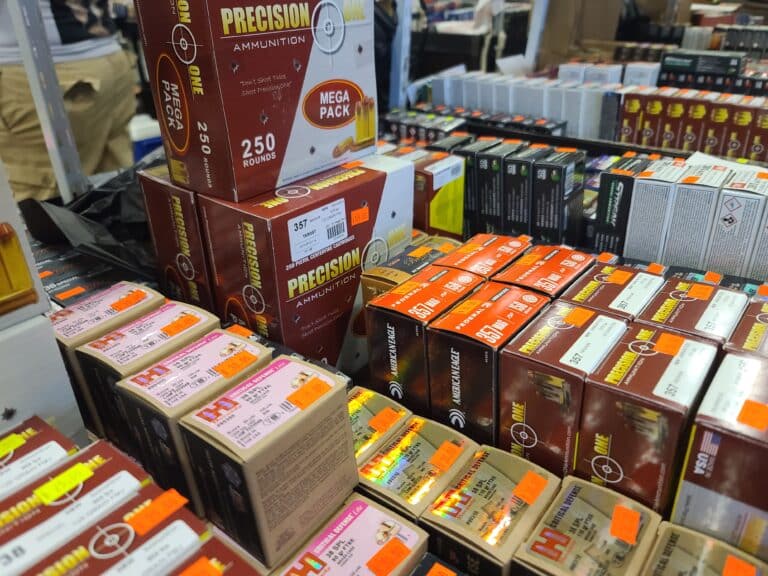A fan-favorite judge among gun-rights advocates knocked out the Golden State’s ammunition background check system on Wednesday. But he also hinted an alternative proposal could pass legal muster.
US District Judge Roger Benitez issued a permanent injunction against California’s criminal background check requirement for ammunition purchases and interstate sales restrictions after finding that they ran afoul of the Constitution’s Second Amendment and dormant Commerce Clause.
“In the end, the State has failed to carry its burden to demonstrate that the ammunition background check laws ‘are consistent with this Nation’s historical tradition of firearm regulation,’ as required by Bruen,” he wrote in Rhode v. Bonta. “Therefore, California’s ammunition background check system laws are unconstitutional and shall not be enforced.”
But while Benitez had little doubt about the Constitutional infirmity of a point-of-sale background check system for ammunition, he expressed far more openness to a less burdensome permitting system designed to achieve the same goals.
“Such a system would clearly be a more reasonable constitutional approach than the current scheme,” he wrote.
Of course, Benitez did not offer up the idea of an ammunition purchase permit scheme out of whole cloth. His comparison stemmed from the California legislature’s decision to rework a voter-approved policy.
Passed via ballot initiative Proposition 63 in 2016, California voters originally designed the ammunition law to operate as a permit regime. As passed, the law would have required prospective ammunition buyers to first obtain a $50 license. That permit, which would have been valid for four years, would have been used to purchase and possess ammunition.
However, before that system ever took effect, the California legislature opted to ditch it in favor of a point-of-sale background check requirement for every single ammunition purchase, akin to how federally-licensed dealers conduct gun sales.
“Why the legislature eliminated the voter-approved 4-year permit system in favor of an every-purchase background check scheme is not apparent,” Judge Benitez wrote.
At nearly every turn during his analysis, he posed the permitting scheme approved by California voters as a better alternative for meeting the state’s professed goals in enacting an ammunition background check system.
“Even if the advent of government database searching via the internet justified a prohibited persons clearance check, such a check could be accomplished with the more reasonable 4-year purchase permit card that the voters approved in Proposition 63,” Benitez wrote. “Even if one argued that a prohibited person with a ghost gun could be blocked with a background check, the check could be accomplished with the more reasonable 4-year purchase permit card that the voters approved in Proposition 63.”
In total, he devoted space to favorably contrasting the permitting scheme approved by voters to California’s legislative approach in no less than four separate sections of his 32-page opinion.
Benitez did not do a full analysis of why a purchase permit scheme might be “a more reasonable constitutional approach” than the one he struck down. However, his opinion did offer some clues.
In the discussion over California’s now-enjoined background check system, the state’s Attorney General cited a footnote in Justice Clarence Thomas’ majority opinion in Bruen—which clarified that the Court was not casting doubt on “shall-issue” licensing regimes and their background check requirements—as legal support for the state’s background check law.
Judge Benitez rejected that argument and explained that the California background check system’s multi-year struggle with high rates of false denials and comparatively low rates of successfully flagging armed criminals were indicative of the sort of regimes that footnote explicitly warned against.
“The Attorney General posits that footnote nine provides constitutional approval of the background check laws,” Benitez wrote. “He does not acknowledge that the California architecture may be that abusive permitting scheme which footnote nine describes as constitutionally suspect: ‘regimes where, for example, lengthy wait times in processing license applications or exorbitant fees deny ordinary citizens their right to public carry.’ This lawsuit is that constitutional challenge to an ammunition purchase authorization regime where record data mismatches, lengthy and occasionally infinite wait times, and sometimes exorbitant fees, are currently denying ordinary citizens their right to public carry.”
In other words, had California gone ahead with the original Proposition 63 scheme approved by voters and administered it without delay or abuse, Benitez may have accepted California’s defense of the law on constitutional grounds. At the very least, it seems the state would have had a better chance.
It also would probably have a better chance at the Supreme Court. After all, the aforementioned footnote came directly from a Supreme Court majority opinion. Plus, Chief Justice John Roberts and Justice Bret Kavanaugh wrote a concurrence in Bruent emphasizing that less burdensome shall-issue licensing regimes are likely constitutional–though they were referring specifically to gun-carry permitting in that case.
To be sure, Benitez took great care to note that he was not “judging ultimate constitutionality” of such a system in his Rhode opinion.
Judge Benitez may still reject a law closer to the original version of California’s Proposition 63 after doing a complete Bruen historical analysis. Similarly, Justices Roberts and Kavanaugh may see a difference between licensing carry and licensing sales that makes the latter constitutionally unworkable in their view.
Nevertheless, the conservative jurists’ openness to at least some permitting systems provides clues that those systems might fare better than expected in future cases.






